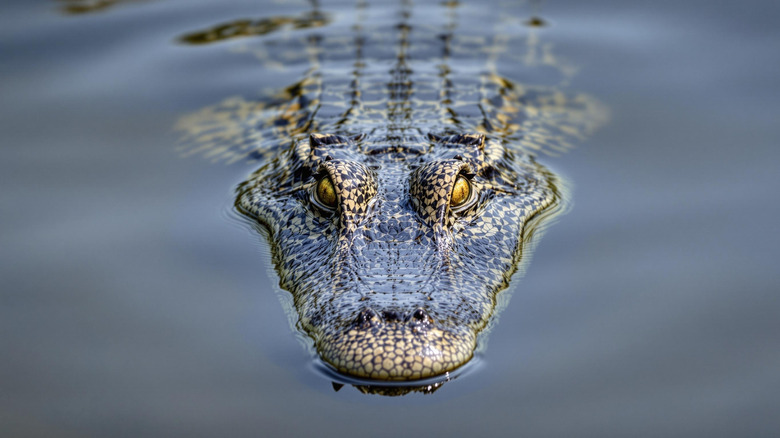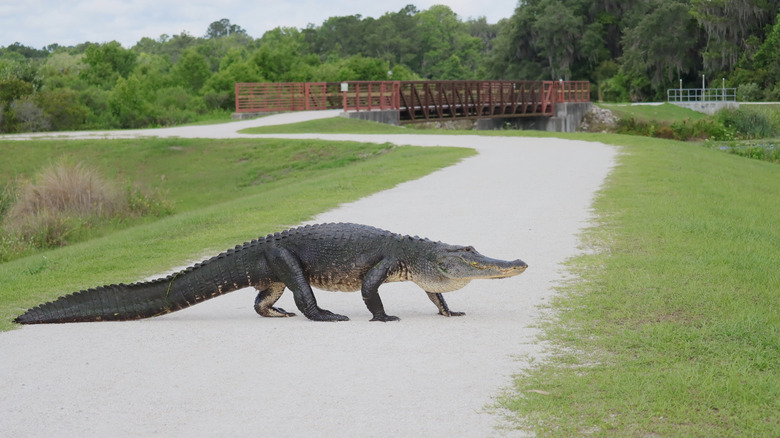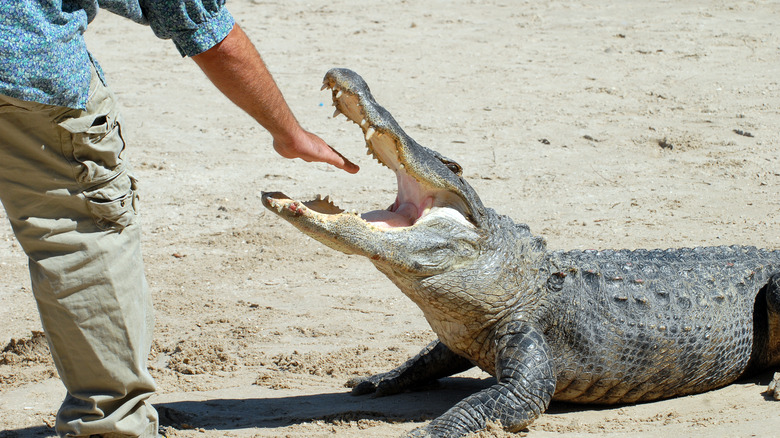The Disturbing Dangers Of Paddling Florida's Alligator-Infested Waterways
Getting attacked by an alligator is the stuff of nightmares. Tragically, that nightmare came true for Cynthia Diekema (via the Guardian), a 61-year-old Florida native, during an unremarkable canoe trip on Tiger Creek, not far from Orlando. She was paddling with her husband in early May 2025, when a startled alligator tipped the canoe sideways. Both fell out, and the alligator lunged at Diekema, biting her fatally. Her husband attempted to fight off the alligator, to no avail. Investigators ruled that the attack was an accident — both boaters and the 11-foot reptile were just in the wrong place at the wrong time.
These kinds of attacks are both common and rare, depending on how you look at it. Since 1948, there have been 487 documented attacks by alligators in Florida; specifically, these are "unprovoked bites," which means that the humans didn't do anything hostile, like poke the alligator with a stick; and yet, just because someone was nearby, the alligator sank teeth in human flesh. Of those attacks, 27 resulted in death. This averages to about one lethal encounter in Florida every three or so years, which is a pretty small number, considering the state is home to about 1.25 million alligators — and 22.6 million people.
But Cynthia Diekema's horrific story is an important reminder that alligators are powerful creatures, and they are fully capable of injuring or even killing humans who get too close. Diekema's behavior wasn't reckless or foolish, but some travelers get cavalier about Florida's most infamous wildlife. It's true that gators are more afraid of you than you are of them, but if they feel cornered, they're also stronger, faster, and less inhibited. There are great destinations to spot alligators in the Everglades, but it's best to appreciate them from afar.
What makes Florida alligators unique
The American alligator, or Alligator mississippiensis, has found habitats across the Southeast U.S., from Texas and Oklahoma to the Carolinas, but they hold a special place in Florida's popular imagination. Indeed, visitors may very well spot one in developed settings without even trying. Researchers have found evidence of modern alligators in proto-Florida from 8 million years ago, eons longer than any human, and gator references and paraphernalia are everywhere. The alligator is the official state reptile, and it's also the namesake of the Gators, the football team of the University of Florida. Alligators are farmed for their skin and meat; you can walk into any number of Florida restaurants and order fried gator bites.
What's surprising about these creatures is how big they can get: Male alligators can grow to 13 feet in length and weigh over 500 pounds. The vast majority of Florida's alligators spend their days sunning, floating motionless in the water, or stalking small prey, like fish and waterfowl. Alligators have little interest in people, unless they get too close or have brought something edible. At the same time, gators are a fixture of Floridian life, wandering across roads and parking lots and occasionally making themselves at home in suburban swimming pools. This adaptability can make humans more cognizant of their scaly cohabitants — and also embolden them to bad behavior.
While most people can't tell one from the other, the American alligator is technically different from the American crocodile (Crocodylus acutus), which generally has a slimmer body and a more pointed snout. They're not exactly dainty, though; male crocs can measure 20 feet long and 1,000 pounds, about twice their cousins' weight. There are also far fewer of these leviathans: only about 2,000 live in Florida, mostly in these dangerously infested waters.
What to do in case of gators in Florida
The best policy is to avoid alligators altogether. This species may be common, but odds are low that you'll find them in major urban areas or big towns. As a rule, alligators stick to still waters and wetlands, so if you can't see the bottom (or notice a "Danger: Alligators" sign), you probably shouldn't wade out. While no one can blame Cynthia Diekema or her husband for what happened, they were paddling in a shallow, slow-moving creek, which is a common hangout for Florida gators. The Florida Fish and Wildlife Conservation Commission recommends that you only swim in designated waters, and only during the daytime. The same goes for your pets.
If you spot an alligator in an unlikely place, such as a backyard or driveway, call 911; you may not be in immediate danger, but others might not notice the unexpected visitor and end up surprising it, which could be dangerous for both human and animal. If you find yourself exploring the Everglades on foot — there are many established trails through the national park — remember that this is 2,357 square miles of biodiverse parkland, where a good number of alligators roam free. Here's how to protect yourself from animals while hiking.


